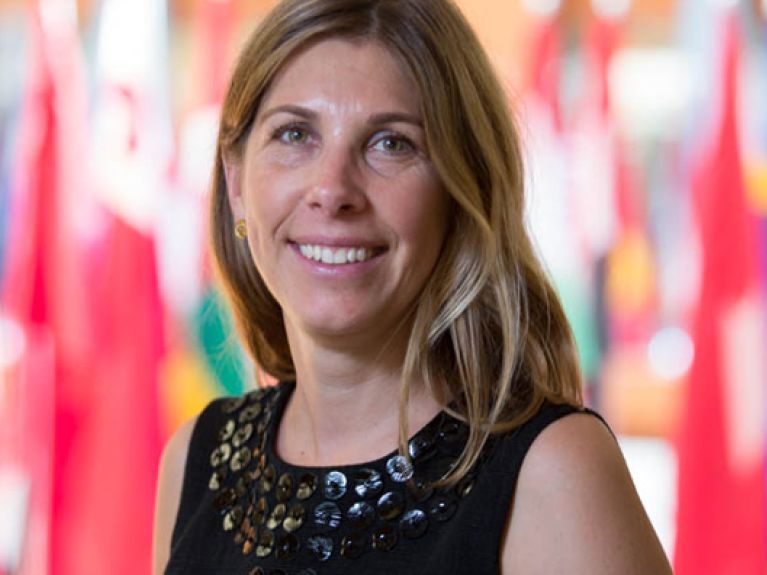Henriette Kolb, World Bank
German ambassadors and senior German colleagues in international organizations present insights into the world of diplomacy and their host countries in the deutschland.de series “Foreign posting”. Part 12: Henriette Kolb, Head of the Gender Secretariat at the International Finance Corporation (IFC) of the World Bank Group, Washington D.C.

You are head of the Gender Secretariat at the International Finance Corporation (IFC) of the World Bank Group. How would you describe your job? What exactly do you do?
My job is very varied and exciting. My main task is developing approaches to create job equality for women and men in the private sector. At the moment, there still aren’t many comprehensive concepts for this. What exactly does this mean? For instance, we are just preparing a report forecasting how large the market share for women will be in the insurance industry in 2030. In the report, which will be published in September 2015, we explain what insurance companies can do, especially in emerging economies, to provide women and their families with better insurance. Our aim is to help women to manage their private and professional risks better and so promote growth.
In its work the IFC encourages its clients to increase the percentage of women in company management and to recognize women as a customer segment with purchasing power, both as independent entrepreneurs as well as employees. The World Economic Forum Gender Gap Report of 2014 has shown how much still needs to be done for the specific economic integration of women. Meanwhile, more and more companies are recognizing that by neglecting gender strategies they are missing out on many opportunities. On the other hand, the growing participation of women in the private sector is offering them a better income, higher educational standards and better health for their families. So both sides are benefitting, as well as the societies.
The IFC is supposed to promote private sector growth in developing countries. How is Germany participating in this and in your organization?
Germany is one of the 188 member states in the World Bank Group and has an individual executive director on the board of directors. Apart from its membership contributions, Germany also shapes the thematic areas of the World Bank Group with its human resources policies. This is done, for instance through the various assignment programmes. For example, Germany gives young professionals the chance to gather multilateral experience through the Junior Professional Programme. I’m really fortunate to be benefitting from this. An exchange of knowledge and expertise between bilateral and multilateral organizations is crucial when it comes to solving global issues together. This applies especially to the gender sphere. At the moment the World Bank Group is developing a gender strategy. The experiences of the member states flow into the consultation process, and we are involved in a constant lively exchange with the Federal Ministry for Economic Cooperation and Development and the Federal Foreign Ministry.
What is a typical work day like for you? And what do you personally like about working in Washington D.C.?
My typical day at work is varied, interesting and long. I am constantly involved in direct dialogue with our clients, colleagues and the management of the World Bank Group as well as with external partners. The activities range from strategy development, product innovation, research, communication and personnel training to constant learning. What is already successful in the market? What can we learn from? Where are the market niches? That’s how we developed our Banking on Women Programme which is now lending banks more than 800 million dollars with the task of granting loans to small and medium-sized companies run by women. We also advise banks directly about how they can employ more women, and how they can gain more women customers. I travel quite a bit, but I also have female colleagues in the regions. You can develop global ideas for new products, but they naturally have to be adapted to the local context and tested.
I really enjoy living in Washington, because politics fascinate me and because I get first-hand experience of the election campaigning which almost never stops here. It was my definite aim to live in the USA, so that I could discover the country in a different way from when I worked with the United Nations in the Middle East. Up to now my view of the USA was mainly from a foreign policy perspective, but now I have a chance to look behind the scenes. I do that by going on trips to the jazz festival in New Orleans, to the little Blue Grass festivals in Virginia, by discovering contemporary American writers, such as Mary Oliver, or through my voluntary work with a food bank.
What in your opinion makes it worth striving to achieve a position of responsibility in an international organization?
I’m very grateful for having been able to work for the EU Commission in Tanzania, the United Nations in Jerusalem and now for the World Bank Group in Washington. In each of these roles, apart from the fascinating job contents, I have valued being able to work with people from around the globe, the chance to see myself and my country of origin through other people’s eyes and to gain a new perspective. But, in my opinion it is also important to be interested in the country where you are a guest. That means making an effort to get to know the language and the history, and to be in touch with the present, too. Otherwise you run the risk of becoming a globe trotter who is detached from the real social problems in your immediate surroundings.
There are moments, when I wonder what my life might have been like without the 17 moves. But I’m very happy about the experiences that I gathered in the various organizations and the lasting friendships that are accompanying me on my journey through life. The job seems slightly less worthwhile, when I still have to explain to myself in the 21st century, why women and men ought to have equal rights and opportunities, and why restricting women’s latitude for decision making makes no sense at all, neither economically nor in society.

